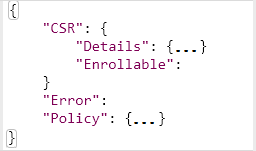POST Certificates/CheckPolicy
Returns the policy and a compliance assessment for a Certificate Signing Request (CSR).
You can also call this method to determine the status of the private key prior to enrollment. Certificates/CheckPolicy:
- Determines whether the private key is already in use.
- Determines whether the policy folder allows a certificate to reuse the same private key.
Requirements
- Permissions: The caller must have Read permission and Private Key Read permission to the Certificate object.
- Token scope: Certificate:Manage
Headers
-
Content type: Content-Type:application/json.
- Token: The bearer access token that you received. For example, Authorization:Bearer 4MyGeneratedBearerTknz==. For more information, see Passing a bearer token in your API calls.
Parameters
|
Name |
Description |
|---|---|
| PolicyDN | The Distinguished Name (DN) of the policy folder. |
| PKCS10 | (Optional) The CSR to use to verify its contents with the Trust Protection Foundation policy. Each new line requires a new line escape character (/n). |
Returns
The response contains CSR compliance details, the Enrollable result, any errors, and policy information from the Policy DN. The response also includes information about errors or a certificate that is currently in the enrollment process. For example, this collapsed set of return values shows you basic information from the Certificates/CheckPolicy response:

Certificates/CheckPolicy:
- Returns a HTTP 200 message and the message body contains data in the Details and Policy fields.
- Returns a HTTP 400 Bad Request for errors and the reason appears in the Error field of the message body.
- Returns a HTTP 403 Unauthorized for requests that lack authorization from Trust Protection Foundation.
|
Name |
Description |
|---|---|
|
HTTP 200 |
For valid requests, this call returns a HTTP 200 message and the following data in the message body: CSR: Information about the Certificate Signing Request (CSR):
|
|
|
Error: Null unless there is an error. If an error occurs, the CsrDetails and Policy values are null and one of the corresponding error messages accompany the HTTP 400 Bad Request:
|
|
|
Policy: The settings from the Policy DN. You can compare these settings to the CSRDetails:
|
|
HTTP 400 |
For invalid requests, this call returns a HTTP 400 BadRequest and the following data in the message body:
|
Example: Determine CSR compliance with a Trust Protection Foundation policy
Request
POST https://tpp.venafi.example/vedsdk/Certificates/CheckPolicy
Authorization:Bearer 4MyGeneratedBearerTknz==
{
"PolicyDN":"\\VED\\Policy\\Import",
"PKCS10":"-----BEGIN CERTIFICATE REQUEST-----\nMIIFPjC... -----END CERTIFICATE REQUEST-----\n"
}
Response
HTTP/1.1 200 OK
{
"CSR":{
"Details":{
"City":{
"Compliant":true,
"Value":"El Granada"
},
"CommonName":{
"Compliant":true,
"Value":"silvana_a37fe.venafi.test"
},
"Country":{
"Compliant":true,
"Value":"US"
},
"KeyAlgorithm":{
"Compliant":true,
"Value":"RSA"
},
"KeySize":{
"Compliant":true,
"Value":2048
},
"Organization":{
"Compliant":true,
"Value":"Venafi"
},
"OrganizationalUnit":{
"Compliant":true,
"Values":[
"Auto"
]
},
"PrivateKeyReused":{
"Compliant":true,
"Value":true
},
"State":{
"Compliant":true,
"Value":"CA"
},
"SubjAltNameDns":{
"Compliant":true,
"Values":[
]
},
"SubjAltNameEmail":{
"Compliant":true,
"Values":[
]
},
"SubjAltNameIp":{
"Compliant":true,
"Values":[
]
},
"SubjAltNameUpn":{
"Compliant":true,
"Values":[
]
},
"SubjAltNameUri":{
"Compliant":true,
"Values":[
]
}
},
"Enrollable":false
},
"Error":null,
"Policy":{
"CertificateAuthority":{
"Locked":false,
"Value":null
},
"CsrGeneration":{
"Locked":false,
"Value":"ServiceGenerated"
},
"KeyGeneration":{
"Locked":false,
"Value":"Central"
},
"KeyPair":{
"KeyAlgorithm":{
"Locked":false,
"Value":"RSA"
},
"KeySize":{
"Locked":false,
"Value":2048
}
},
"ManagementType":{
"Locked":false,
"Value":"Monitoring"
},
"PrivateKeyReuseAllowed":true,
"SubjAltNameDnsAllowed":true,
"SubjAltNameEmailAllowed":true,
"SubjAltNameIpAllowed":true,
"SubjAltNameUpnAllowed":true,
"SubjAltNameUriAllowed":true,
"Subject":{
"City":{
"Locked":false,
"Value":"SLC"
},
"Country":{
"Locked":false,
"Value":"US"
},
"Organization":{
"Locked":false,
"Value":"Venafi"
},
"OrganizationalUnit":{
"Locked":false,
"Values":[
"Venafi Test"
]
},
"State":{
"Locked":false,
"Value":"Utah"
}
},
"UniqueSubjectEnforced":false,
"WhitelistedDomains":[
],
"WildcardsAllowed":true
}
}